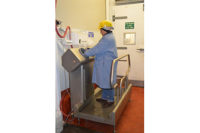Meat and poultry plant workers, along with supermarket meat department staffers, are having a major influence on the state of food safety. Simply put, if they neglect basic hygiene practices — particularly frequent handwashing — many employees are in position to generate and transmit bacteria.
Therefore, protein producers and retailers can dramatically reduce threats by ensuring they educate workers on effective hygienic procedures, then monitoring the associates’ behaviors.
“Many employees underestimate how important it is to consistently wash their hands, and that ties back into whether they had proper training,” says Bartek Dobek, owner of Plainfield, Ill.-based BD Food Safety Consultants LLC. “Because they are undertrained, they don’t realize how Listeria and germs transfer from their hands to food and surfaces.”
Though many procedures are simple, such as having workers hand wash for 20 seconds with warm water and soap and then dry with a towel before handling meat and poultry, it often can be difficult getting staffers to comply, he says.
Other unhygienic acts by employees include touching restroom door handles with bare hands, wiping their noses while working, not changing gloves after taking out trash and not washing after handling a cell phone or smoking, says Melvin Kramer, president of EHA Consulting Group Inc., a Baltimore-based provider of public health consulting, epidemiology and food safety services.
“Poor hygiene is a leading cause of noroviruses,” he says. “People not washing their hands is a real problem. There are facilities with beautiful handwashing sinks and the best soap, hot water and paper towels — that workers are not using.”
Watch the hands
Methods that can help reduce contamination, he says, include the use of foot pedals on sinks so employees don’t have to touch handles that could contain E. coli; and having paper towels handy so workers can open restroom doors without touching contaminants after washing their hands.
To help motivate employees to properly wash their hands and follow other hygienic procedures, supervisors must consistently exhibit their interest in proper behaviors, says Philip Crandall, a professor in the department of food science at the University of Arkansas in Fayetteville.
Such measures can include having managers wash their own hands in front of workers and stressing the importance of cleanliness, which drives home the message that hygiene is part of the company’s culture, he says.
“My eyes are a more willing pupil than my ears,” Crandall says. “Demonstrating handwashing rather than just talking about it speaks volumes.”
Operators can gauge worker adherence to hygienic practices by observing telltale signs, such as how long water remains cold after turning on the hot water tap. A lengthy wait indicates that employees did not recently use warm water for handwashing, Crandall says. Other indicators are empty soap dispensers and paper-towel holders, and waste baskets that do not contain paper towels.
It is the quality of a company’s education program, meanwhile, that often determines behavior.
“Training is the key regardless of the environment,” Kramer says. “You can’t assume workers know what they must do. There also needs to be supervisors telling them whether they are doing a good or bad job during the course of the day.”
Many larger operators leverage online training modules which can more effectively provide information, he says, adding that smaller facilities that lack such educational resources or awareness of proper hygienic procedures often are most ripe for food safety incidents.
Online systems typically include the use of videos, which Dobek says are superior learning tools as it often is easier for workers to grasp and memorize a concept through visualization than by reading text.
Talk is not cheap
Such training programs, Dobek adds, should spell out specific company guidelines for a range of behaviors, including the use of cell phones.
“Allowing phones in food areas is a bad practice as they are never clean or sanitized,” Dobek says. “Touching the phone with clean hands or placing it on a work surface will contaminate the surface and the individual.”
Companies also need policies that prevent employees who are ill from coming to work and spreading germs, Crandall says.
“Hourly workers that don’t show up don’t get paid, so there is a disincentive for staying in bed,” he says.
Operators also must verify that employees understand the hygienic procedures following training, Dobek says. Methods include administering tests and conducting random checks on their actions during the workday. Yet, while companies can mandate practices and implement quality training programs, processors need to remember that employees still have final control over their hygiene. NP





Report Abusive Comment